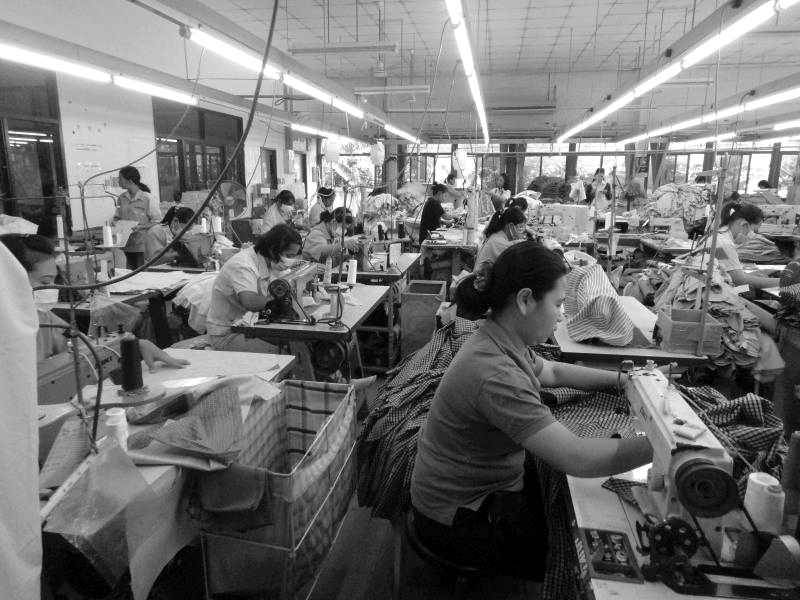Cambodian workers working in Thailand have complained that they are required by their employers to file multiple documents in order to be allowed to work legally. Beside the additional bureaucracy, document handling costs imposed by agencies have largely overwhelmed their daily wages.

File photo
Min Rin, who has been working at an electronics factory in Rayong province for more than two years, said she had to pay 18,000 baht to get a visa, her pink ID card and a work permit. These documents must be renewed once a year, according to Thai law.
She said when Cambodian workers go to work in Thai factories, the employer would process these documents for them, but it is expensive and workers have to cover the cost themselves.
“The boss took 18,000 baht from me. They would get all the documents, including the visa, the pink ID card, and the work permit. But so far, no documents have arrived. I have asked the boss many times, but the boss has not yet reached my name,” she said.
Before the Covid-19 pandemic, the TR 38/1 card for migrant workers, also known as the “pink card”, carried their legitimate immigration status on the front and their work permit on the back. It has to be renewed periodically, depending on the category of the worker.
However, when the outbreak intensified and on-site pink card renewal was difficult due to government offices having to limit the number of visitors, the cabinet, starting in August 2020, came up with the BT 39 or “Blue Book.” This represented the work permit while workers were waiting for their pink cards to be renewed.
Although this was initially aimed at solving the problem, it in fact became an additional process and given how unruly the labour agency business is, it became financially impossible for workers to afford the legal process.
Hands tied by the rule
Rin said that she can earn more than 300 baht a day, but she needs to pay off her debts and her daily expenses first. It is not enough if she also has to pay for all these documents.
Although she paid for all the documents, she still has not yet received them. So she is not sure whether she is a legal worker or not. Currently, she has only a passport, having been waiting more than a year for these documents.
In this situation, workers can do nothing and most face this problem. They do not dare make demands for fear of being fired.
Rin said that if workers did not acquire all these documents, they would become illegal workers. That is why they are willing to save money or let the employer deduct the costs from their salary to do everything.
“It is okay for the employer to deduct from the salary, but we hope we can get the documents when we have paid the full amount to make it easier when we find a new job legally,” she said.
Loeng Sophon, a Thailand-based project officer with the labour rights group Central, said that he asked workers to follow the information clearly because sometimes workers spend a huge sum of money, but do not get their documents.
He added that employers want workers who are legal. That is why workers are required to obtain all the documents. However, employers are sometimes cheated by the agencies that handle the documents too.
Another worker, Moeun Loun, from Pursat province in Cambodia, who works at a Thai cow leather factory, said he had to save money to renew his visa and work permit so he could work legally.
“We have to make it legal according to their country, but it is a high-price,” he said, adding that since he came to work in Thailand, he has spent around 15,000 baht on renewing his visa and pink ID card every year.
Cost of working legally
Loun asked the Thai Ministry of Labour to facilitate the extension of Cambodian workers' visas and other documents at a low cost. He also asked for payment in instalments.
Adisorn Kerdmongkol, a coordinator from the Migrant Working Group (MWG), an NGO that addresses migrant workers’ issues, said that there is no rule putting a fee ceiling for labour agencies, resulting in them charging migrant workers tens of thousands of baht just for document handling.
According to Adisorn, it costs 900 baht plus 100 baht of operation fee to issue a one-year work permit, 80 baht for the pink card, 500 baht for a health examination, 3,200 baht for health insurance, and 1,900 baht for issuing a visa if needed.
In total, it costs about 7,000 baht, but an additional operational fee of more than 10,000 baht is added by the agencies.
Sophon stated that workers are required to submit work documents to the Thai Ministry of Labour. If workers do not follow the Ministry rules, they will become illegal workers. Therefore, the Ministry has issued an order to the employers to prepare documents related to work permits, visas, and pink ID cards for workers.
He said that the workers are worried about the cost of these documents because since the beginning of the Covid-19 outbreak until now, their work situation is still precarious.
The Cambodian Ministry of Labour was asked to cooperate with the Thai Ministry of Labour on the cost of all these documents so as not to seriously affect the lives of workers, since a Ministry team visited some Cambodian workers' communities in Thailand, where the workers raised this issue.
Heng Sour, a Cambodian Labour Ministry spokesperson, could not be reached for comment.
According to the labour rights organization Central, there are about 2 million Cambodian workers working legally and illegally in Thailand.
Seoung Nimol is Prachatai English intern from the University of Cambodia.


